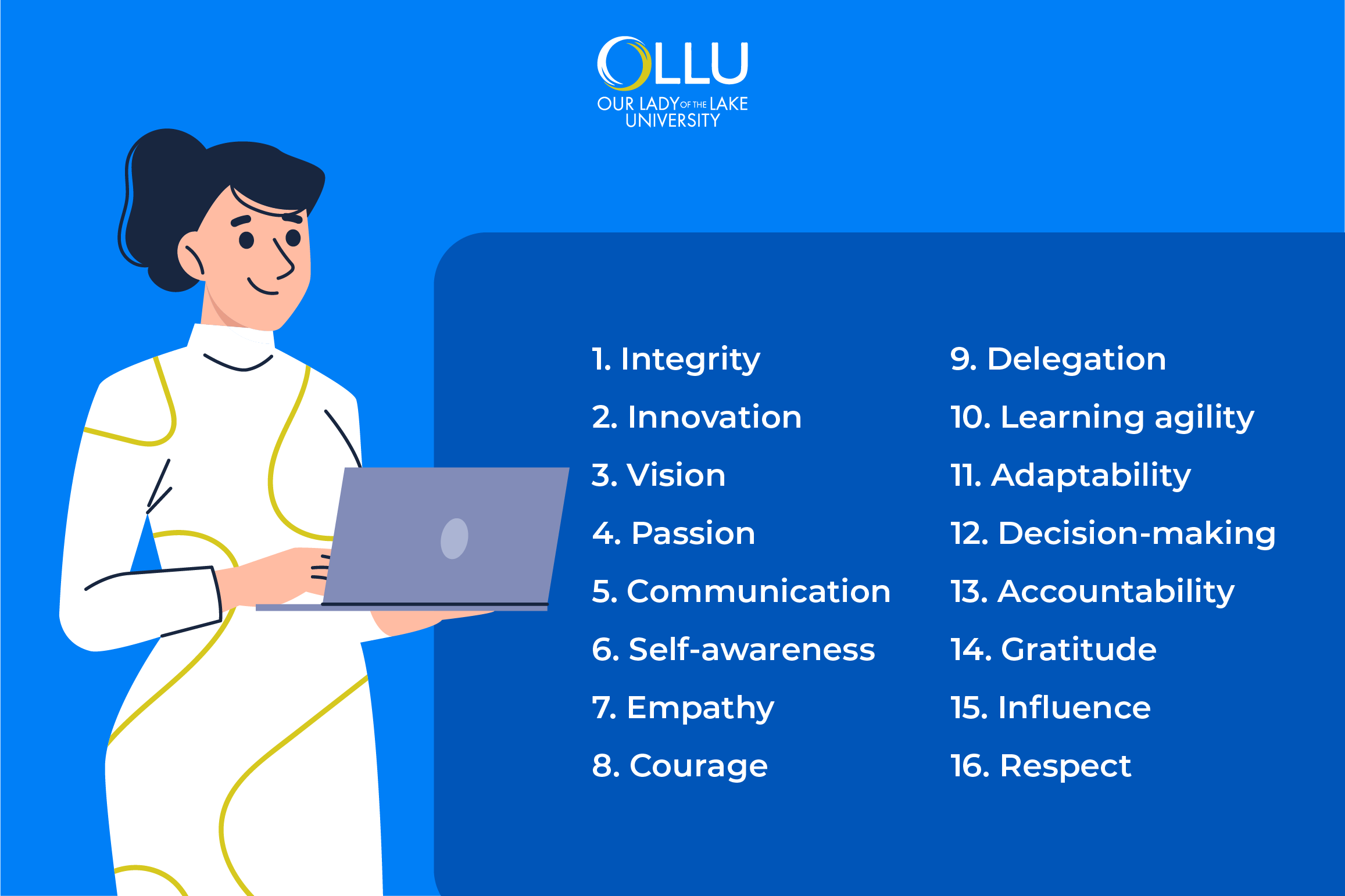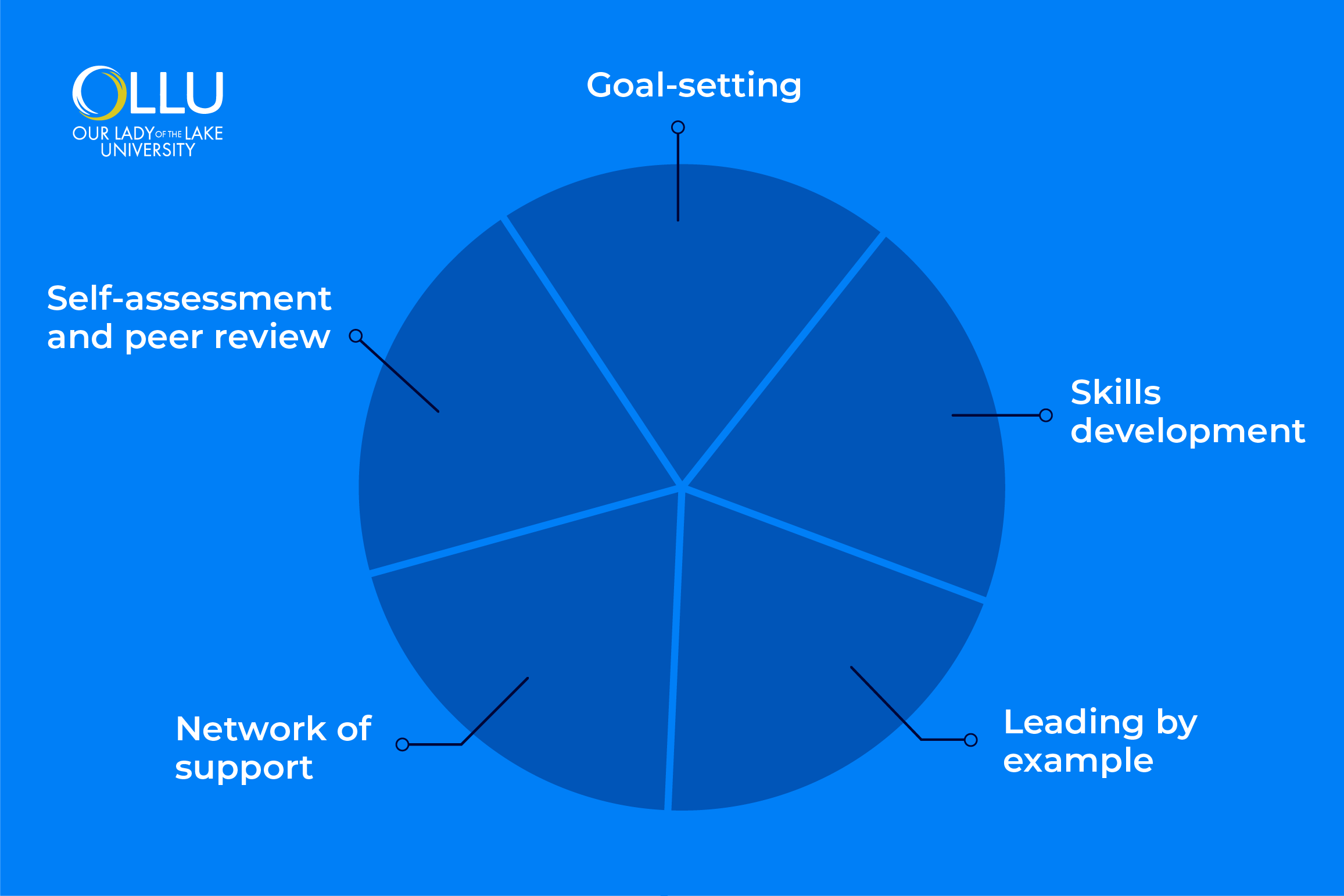16 Must-Have Leadership Qualities
16 Must-Have Leadership Qualities

Leadership qualities are the foundation upon which exceptional leaders are built. In today’s dynamic and ever-evolving business world, effective leadership has become more crucial than ever before. It is the catalyst that propels organizations to new heights, inspires teams to achieve greatness and fosters a culture of innovation and success.
In our quest to uncover the secrets to exceptional leadership, we embark on a journey to explore 16 must-have leadership qualities that define outstanding leaders. When cultivated and harnessed, these qualities empower individuals to lead with vision, empathy and unwavering commitment, driving personal and organizational growth.
What Is Leadership?
At its core, leadership is the art of guiding, inspiring and influencing individuals or groups toward achieving a common goal or vision. It is a multifaceted concept, embodying a diverse set of qualities, characteristics and attributes that collectively define effective leadership.
Far from being limited to a single trait, effective leadership is a rich amalgamation of various qualities such as integrity, vision, communication skills, adaptability, empathy, resilience and a dedication to continuous learning.
These strengths and skills enable effective leaders to navigate challenges, foster collaboration and drive results. What sets exceptional leaders apart is their ability to lead by example, inspire trust and empower those around them to realize their full potential.
In summary, leadership is a dynamic blend of attributes that, when effectively harnessed, can catalyze positive change and steer both individuals and organizations toward success.
16 Essential Characteristics of a Good Leader

Effective leadership combines vital qualities that pushes individuals and organizations toward success. These 16 essential characteristics represent the foundation of a good leader’s ability to inspire, guide and empower.
Each trait holds a unique significance in the leadership journey, from integrity to influence. In the following paragraphs, we’ll explore these characteristics, shedding light on why they are indispensable and how they collectively shape leaders who drive positive change.
1. Integrity
Integrity is the cornerstone of trust in leadership. A good leader must possess unwavering integrity to inspire confidence and maintain credibility. When leaders consistently uphold their values and principles, they set a moral compass for their teams, fostering an environment of honesty and dependability.
2. Innovation
Innovation is vital for staying competitive and driving progress. Good leaders encourage innovation by valuing new ideas and creative problem-solving. They recognize that embracing change is essential to adapt and thrive in a constantly evolving world.
3. Vision
A leader’s vision provides direction and purpose for their team. It creates a shared goal that motivates and guides everyone toward a common objective. A leader with a clear vision can inspire and align their team’s efforts toward achieving ambitious goals.
4. Passion
Passion fuels dedication and perseverance. Good leaders are passionate about their work and vision, which motivates them and inspires others to give their best. This enthusiasm can drive a team to overcome obstacles and achieve greatness.
5. Communication
Effective communication is a linchpin of leadership. Leaders must articulate their vision, provide guidance and listen actively to their team. Strong communication skills ensure that messages are understood, fostering collaboration and trust.
6. Self-awareness
Self-aware leaders understand their strengths and weaknesses. This awareness enables them to make informed decisions, leverage their strengths and work on areas that need improvement. It also allows them to relate better to their team members.
7. Empathy
Empathy is the ability to understand and connect with others emotionally. Good leaders use empathy to build rapport, resolve conflicts and create a supportive and inclusive work environment. It shows team members that their leader cares about their well-being.
8. Courage
Leadership often requires making tough decisions and facing challenges head-on. Courageous leaders are willing to take calculated risks, stand up for their beliefs and confront difficult situations, even when uncomfortable.
9. Delegation
Effective delegation is a mark of a confident and capable leader. By entrusting tasks to team members based on their strengths and skills, leaders empower their teams to take ownership and develop their abilities. This frees up the leader to focus on strategic aspects of their role.
10. Learning agility
In a rapidly changing world, leaders must be quick learners. Learning agility allows leaders to adapt to new information and circumstances, continuously improving their decision-making and problem-solving abilities.
11. Adaptability
Leaders must adapt to evolving situations and challenges. Those who can embrace change and adjust their strategies accordingly are better equipped to lead their teams through uncertainty and ambiguity.
12. Decision-making
In leadership, decision-making isn’t just a task—it’s a pivotal skill. Effective leaders don’t make choices on a whim; they thoughtfully align each decision with their broader vision and goals. They seek diverse opinions, carefully weigh the pros and cons and then choose a course of action with conviction. This meticulous approach not only drives their objectives forward but also builds trust and respect among team members, reinforcing the leader’s role as a trusted guide.
13. Accountability
Accountability means taking responsibility for one’s actions and decisions. When leaders hold themselves accountable, they set a standard of responsibility for their team, fostering a culture of ownership and reliability.
14. Gratitude
In a leadership role, expressing gratitude goes far beyond simple courtesy; it serves as an acknowledgment of the hard work and contributions of team members. This practice not only boosts morale but also strengthens interpersonal relationships and fosters a positive work environment. Such an atmosphere becomes a catalyst for motivation and productivity, reinforcing the leader’s role as an uplifting and empowering presence.
15. Influence
Influential leaders inspire others to follow their lead willingly. They lead by example, creating a shared sense of purpose and commitment within the team. Their influence stems from their character, actions and ability to connect with others.
16. Respect
Respect for all team members, regardless of their role or background, is essential for creating a harmonious and inclusive workplace. Leaders who demonstrate respect foster a culture of collaboration and mutual support, enabling everyone to thrive.
How To Cultivate Good Leadership Traits

Cultivating exceptional leadership qualities is not a destination but an ongoing journey—one that demands consistent self-awareness, unwavering dedication, and a proactive mindset. The cornerstone of this transformative path lies in attaining a comprehensive understanding of your inherent strengths as well as identifying areas that require improvement.
Self-assessment and peer review
Start by conducting periodic self-assessments to gauge your competencies and weaknesses. But don’t just stop there; consider supplementing your self-reflection with structured, constructive feedback from peers, mentors, and even subordinates. Such multi-dimensional insights can offer a fuller picture of your leadership acumen and illuminate paths for personal growth.
Goal-setting
To sustain the momentum of your leadership development, it’s vital to delineate specific, measurable goals that align with both your personal growth and the overarching objectives of your organization. These goals serve as your compass, directing your actions and decisions toward meaningful change.
Skills development
While technical skills have their place, soft skills like empathy, active listening and effective communication are crucial for exemplary leadership. These are skills that can’t be automated or outsourced. To enhance these abilities, seek out dedicated learning platforms—workshops, seminars, or online courses—to hone these invaluable assets. The goal is not just to lead but to lead effectively, to be a leader others willingly follow.
Leading by example
It’s not enough to preach the qualities of effective leadership; one must embody them. Consistency in action is key. Strive to be the role model that your team needs, displaying the same traits you aim to nurture in them. Authenticity in your behavior sends a strong message that you are committed to the same values you espouse.
Network of support
No leader operates in isolation. Cultivating a robust network of mentors, peers and even industry experts can offer a reservoir of wisdom and moral support. Such relationships not only serve as a source of guidance but also offer the psychological bolstering needed to face the challenges of leadership with resilience.
The Bottom Line
In our comprehensive exploration of the 16 quintessential qualities that make an extraordinary leader, we’ve peeled back the layers to reveal the core principles that serve as a guiding compass. These aren’t mere attributes; they’re the pillars on which impactful leadership is built. As we draw this chapter to a close, it’s essential to remember that leadership is not a milestone you reach but an ongoing journey of personal and professional evolution.
Your Opportunity for Transformation
Ready to stand out as a leader who not only commands but also inspires? Interested in elevating your influence and making a lasting impact on both your organization and the people you lead? The PhD and MSOL programs at OLLU are meticulously designed to transform your potential into prowess. Here, you won’t just learn about leadership; you’ll live it, breathe it and most importantly, you’ll embody it.
Join us in a transformative academic experience that goes beyond textbooks to instill the practical skills and ethical foundations vital for leadership excellence. Embark on a fulfilling journey that starts at OLLU and has no finish line. Discover our diverse array of programs today and take the pivotal first steps toward becoming the exceptional leader you are destined to be.
FAQ
What are the 4 pillars of courageous leadership?
Courageous leadership is built upon four key pillars:
1. Vulnerability: Courageous leaders are willing to show vulnerability by admitting their mistakes, sharing their fears and being open about their shortcomings. This authenticity fosters trust and connection within teams.
2. Clarity of values: Leaders should clearly understand their values and principles. This clarity helps them make ethical decisions, set a strong example and align their actions with their values, earning the respect of their team.
3. Resilience: Courageous leaders display resilience in the face of adversity. They persevere through challenges, bounce back from setbacks and inspire their teams to do the same. This resilience creates a culture of determination and perseverance.
4. Empathy: Empathetic leadership is essential. Leaders who show empathy understand their team members’ perspectives, emotions and needs. This empathy enables them to provide support, foster collaboration and build strong relationships.
What is the golden rule of leadership?
The golden rule of leadership is to treat others as you would like to be treated. In essence, it means leading with empathy, respect and fairness. As you would expect consideration and fairness from your leader, you should extend the same courtesy to your team members. By adhering to this principle, leaders create a positive and supportive work environment, fostering trust and collaboration among team members.
Why should I be a leader?
There are several compelling reasons to become a leader:
- Personal growth and development are significantly enhanced through leadership roles.
- Leadership offers the opportunity to make a positive impact on both individuals and organizations.
- As a leader, you have the ability to inspire and empower others.
- Gaining a leadership position often leads to recognition and achievement.
- Leadership roles provide the chance to tackle challenging problems and drive change.
How can leaders motivate employees?
- Leaders can motivate employees by offering recognition and appreciation for their hard work.
- Clear and transparent communication from leaders can greatly enhance employee motivation.
- Providing employees with a sense of empowerment and autonomy can boost their enthusiasm and engagement.
- Leaders can offer opportunities for professional growth to motivate their team members.
- Aligning individual and team goals with the organization’s mission can foster a sense of purpose and drive.
- Offering constructive feedback and coaching can help employees improve and stay motivated.
- Leading by example is a powerful way to inspire and motivate a team.
- Promoting a work-life balance can increase overall job satisfaction and motivation.
- Fostering an inclusive and collaborative work environment can uplift all employees.
- Implementing recognition programs and incentives can provide tangible rewards that motivate employees.










































































